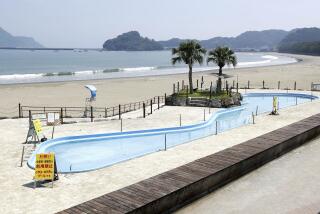JAPAN : Self-Restraint Goes Without Saying in Wake of Kobe Quake
- Share via
TOKYO — The emperor of Japan has canceled his spring party; the prime minister has nixed his cherry blossom viewing. Shoppers, travelers, boozers and party-goers are holding back too.
Ever since a killer earthquake tore apart the city of Kobe last month, the number of visitors to the neighboring cultural center of Kyoto has plunged by as much as 50%. The same invisible force that is holding down tourism there--a sense of restraint against cheery events--is also suppressing efforts to revive it.
“City officials wanted to actively promote a campaign to lure back tourists. . . . But if you think of the victims who suffered from the quake, the campaign itself might attract criticism,” said Hiroshi Otani, a Kyoto tourist official.
Not since the late Emperor Hirohito died six years ago has such a national mood of jishuku , or self-restraint, gripped Japan.
No one ordered it. No one in particular even suggested it. It simply took hold, quietly but firmly, in the same way that many national moods here form: People sniffed the air, watched their neighbors and followed suit.
The widespread practice of self-restraint stems from Japan’s consciousness as a family nation, said Tsuneo Ayabe, a professor emeritus of cultural anthropology at the University of Tsukuba in Ibaraki.
“In Japan, when you lose a family member or relative, you mourn by not sending a New Year’s card,” he said. “As an extension of this behavior, even when you see an unrelated person suffering from an unhappy event, you tend to refrain from entertainment, because people feel they belong to one big community.”
The Japan Travel Bureau estimates that revenue losses will total $250 million from January through March this year because of massive tour cancellations.
Shopping for luxuries is down, including a 10% drop in pearl sales by Mikimoto, the famous Japanese jeweler. And toy sales at some Kiddieland stores are down by as much as 70%, particularly in the Kobe-Osaka area.
The flip side to the empathy can be a vicious condemnation of those who do not adhere to the social code of restraint.
Hideo Nakano, a Miura City Council member and a travel agency president, had planned a tour to the earthquake site as a way to help “deepen understanding” of the disaster. According to his wife, Nakano had volunteered in the area and wanted to raise money for relief activities; he had announced that part of the proceeds would be donated to the victims.
But the plan drew such wrath that Nakano was forced not only to quit his travel agency post but also his City Council seat.
*
Yoshiko Shimada, an artist, said the mood of self-restraint can lead to social tyranny.
During the emperor’s illness, she was asked to sign a neighborhood circular wishing him a quick recovery, but she balked because she does not support the imperial system.
“They don’t force you. They ask you. But it’s very, very difficult to say no. They look at you and say, ‘Are you weird?’ Or they talk behind your back,” she said.
What, exactly, deserves restraint is hard to say.
Hiroyoshi Ishikawa, a professor at Tokyo’s Seijo University, said the Japanese have an almost instinctive sense about it, instilled by centuries of agricultural tradition that divided the community’s daily mundane work from the occasional breaks of festivals and other events. A sense of the dividing line is still deeply rooted, he said.
Nor is anyone sure when the self-restraint period will end, because there is no clear event, such as the emperor’s funeral, to mark a passage.
In any case, some people believe that laughter is better medicine than sober restraint. In a small park in Kobe, volunteers have put up a genki mura, or “feel-good village,” to boost the spirits of the quake victims. On a recent evening, they dared to dance.
“Anyone is free to enter,” a sign says, “as long as you agree to eat, have fun and feel good.”
More to Read
Sign up for Essential California
The most important California stories and recommendations in your inbox every morning.
You may occasionally receive promotional content from the Los Angeles Times.














